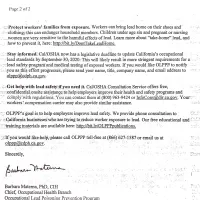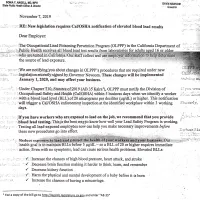The law, also known as CA AB 35, went into effect January 1. It requires businesses to report a worker’s blood lead level (BLL) exceeding 20 micrograms per deciliter (µg/dL) to the health department. Under this new mandate, California’s Department of Public Health (DPH) must notify the Division of Occupational Safety and Health (Cal/OSHA) within 5 days of receiving that report. After that, Cal/OSHA must then launch an investigation.
California Gov. Gavin Newsom signed the bill back in October 2019. It’s geared toward improving how public health officials handle cases of lead poisoning, but it’s causing frustration among some radiator shop owners.


Letter sent to California radiator shops
A NARSA member and radiator shop owner in central California believes the new regulations are unreasonable. “I know we’re exposed to lead more than the average person, so our number is going to be up higher, but they’re really coming down on these numbers to where it’s going to be hard to operate without being fined or restricted in some way,” he said. “I can understand the 40 mark, but 20 is way too low… I’m all for safety. I’m all for keeping people healthy, don’t get me wrong. They just keep dropping the numbers.”
Asemblymember Ash Kalra (D-San Jose), who sponsored the bill, has spent the last 3 years working on getting the measure into law. “Without this legislation, countless numbers of workers, including those in the automotive and heating and cooling industry, could remain exposed to lead at their jobs, making them vulnerable to irreparable neurological damage and heart disease,” said Kalra. “We took a common-sense approach with AB 35 to help ensure that proper notifications and follow-up between DPH and Cal/OSHA are made, in order to protect present and future workers and their families.“
“I know we’re exposed to lead more than the average person, so our number is going to be up higher, but they’re really coming down on these numbers to where it’s going to be hard to operate without being fined or restricted in some way. I can understand the 40 mark, but 20 is way too low… I’m all for safety. I’m all for keeping people healthy, don’t get me wrong. They just keep dropping the numbers.”
The motivation behind this bill stemmed from investigative reports by the USC Annenberg Center for Health Journalism and the publication Capital & Main in 2018. Those findings claimed the CDPH knew thousands of workers at a car battery recycling plant had high levels of lead in their blood, but the health department failed to alert Cal/OSHA. The investigation went on to note that hundreds of those workers had been suffering from lead poisoning since the 1990s. Furthermore, through examining children’s baby teeth, scientists discovered people living within 1.7 miles of the Exide factory were exposed to lead due to airborne lead that eventually contaminated the soil. The California business owner, who asked not to be identified, doesn’t dispute the research behind that USC report or the impacts of the battery plant investigation, but he feels that radiator shops shouldn’t be grouped together with big factories. He also believes more government intervention is unfair.
“I’m just getting fed up with it. It’s giving them more and more power to come in and look around, even though I’m not trying to hide anything. That part is upsetting,” he said. “I’m not paranoid, but it’s like they’re coming more at you every time with different angles. And to me, it’s opens the door for them to come in and kind of snoop around and try to find something else. That’s what bothers me.”
WHAT ARE THE CURRENT FEDERAL GUIDELINES?
“While the laws vary state by state on when an OSHA investigation is triggered, the current federal lead standard for construction workers is 50 micrograms per cubic meter of air. Radiator shops fall under that category. That means temporary medical removal is mandated for any worker who has a periodic and a follow-up blood sampling test that indicate the blood lead level is at or above 50 µg/dL, according to OSHA. Employees can return to work if it drops below 40 µg/dL”
WHAT ARE THE EFFECTS OF LEAD EXPOSURE?
Lead is a potent neurotoxin. No amount of lead exposure is considered safe, according to the National Institute for Occupational Safety and Health (NIOSH). Short-term overexposure to lead can result in:
- Abdominal pain
- Constipation
- Fatigue
- Headaches
- Irritability
- Loss of appetite
- Memory loss
- Pain or tingling in the hands and/or feet
WHAT DOES THIS MEAN FOR THE RADIATOR INDUSTRY?
According to Centers for Disease and Control (CDC), workers in the heating and air and automotive industries are among those most vulnerable to lead exposure. Radiator shops use soldering tools which contain lead.
The NARSA member in California says the state is putting a lot of pressure on radiator shops. “I think one of these days in California, they’re going to ban soldering in a business unless you have a way to scrub the air, which won’t be cost-effective for a shop owner. You can’t afford it. The numbers aren’t there anymore,” he said. “I can see California coming up to a point where you won’t be able to solder anymore on a daily basis.”
In light of these new changes, radiator shops and other businesses which handle equipment with lead will need to be more vigilant or they could face legal consequences. Some companies have already chosen to go lead-free.
“Even though there is a learning curve to using lead-free solders and most experienced radiator technicians resist using lead-free solders, it can definitely help to substantially reduce exposure to lead,” said Mark Taylor, NARSA’s Executive Director. “There were some shops in the early 90s who totally transitioned to lead-free solders. The fluxes and solder formulas currently available have improved over the years to increase the user friendliness, but it still remains a small challenge to use lead-free solder.”
Respirators are another solution to lead exposure. “Even though there are regulations that govern the use of respirators, they can be used exclusively or in conjunction with other controls to reduce the exposure to lead,” said Taylor. “The problem with lead in solders is it becomes airborne when heated with a torch. This airborne lead, if not exhausted properly, will collect on any surface it comes in contact with whether stationary or moving.”
“The legislation in California won’t be repealed, so it is up to the business owner as an entrepreneur to find a business solution that will satisfy the new regulation. As there are hardly ever two radiator repair facilities that perform exactly the same repair, there will be multiple solutions created by different radiator service facilities as they employ a combination of various tactics to control the exposure to lead.”
Mark Taylor
NARSA/IDEA Executive Director
Other safe practices include having employees wear company uniforms, and never allowing those clothes to leave the premises. Dirty clothes should be kept in a clearly lead container.Mark Taylor
NARSA/IDEA Executive Director
The California radiator shop owner remembers a time when the rules weren’t as strict. “My grandfather bought the business back in ‘55. Back then, we didn’t have laws about smoking or eating in the contaminated areas. Heck, they used to smoke at the bench. You put your fingers on solder, then on your cigarettes and you put it in your mouth,” he said. “They lived to rip old ages, probably older than people nowadays. We’ve had guys who retired out of our shop, and they didn’t die at a young age or have impairments that were obvious.”
But those days are long gone, according to NARSA Executive Director Mark Taylor. “It is true that many years ago, before the effects of lead were widely known, radiator technicians would smoke and eat at the work area without washing their hands and face first. They would stand in front of a radiator with a cigarette in their mouth, torch in one hand and a stick of solder in the other hand without wearing gloves. Who knows what health issues or problems related to exposure occurred in those people?”
Taylor believes having a clean repair facility with proper environmental controls is of the utmost importance. “The legislation in California won’t be repealed, so it is up to the business owner as an entrepreneur to find a business solution that will satisfy the new regulation,” said Taylor. “As there are hardly ever two radiator repair facilities that perform exactly the same repair, there will be multiple solutions created by different radiator service facilities as they employ a combination of various tactics to control the exposure to lead.”